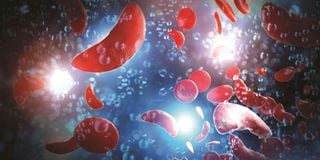Turning sickle cell ‘curse’ into an opportunity for medical progress

Globally, it is estimated that sickle cell disease (SCD) accounts for between six and 15 percent of deaths among children aged less than five.
What you need to know:
- One of the major advancements witnessed in Bungoma this year is the improved coordination between obstetricians and haematologists during childbirth. The role of the obstetrician is to ensure the quickest and safest delivery method, while the haematologist focuses on managing the anaemia.
- Previously, this comprehensive approach was only accessible to a privileged few, resulting in the unfortunate loss of many young mothers.
Bungoma County, situated in Western Kenya, has a high prevalence and incidence of Sickle Cell Disease (SCD). The earliest settlers in Bungoma and the wider Mt Elgon region are said to have had a gene mutation in their blood cells that left many of them as SCD carriers.
Over time, the carriers intermarried, leading to children with full blown SDC.
Other factors that have contributed to the high prevalence in the region are high altitude and a changing climate. Bungoma is in a high altitude area.
High altitude areas have less oxygen, meaning for people with SCD, they are exposed to the risk of blood clots because of less oxygen circulation. These risk factors mean more hospital visits.
Looking at it differently, these factors have made the region key in experimenting advancement in sickle cell management.
The advancements include targeted medications, gene therapies and stem cell transplants. The pace of advancement has been greater this year because the society has started to accept that SCD is not curse but a manageable disease.
Young pregnant mothers with sickle cell have been one of the most key beneficiaries of targeted medication to treat the disease.
This has helped these women exceed their life expectancy – most people with sickle cell do not live beyond 16 years – transition into early adulthood and start families.
The most significant challenge faced when a young expectant mother with SCD goes into labour is deciding whether to address her low blood levels or proceed with delivering the child.
One of the major advancements witnessed in Bungoma this year is the improved coordination between obstetricians and haematologists during childbirth. The role of the obstetrician is to ensure the quickest and safest delivery method, while the haematologist focuses on managing the anaemia.
Previously, this comprehensive approach was only accessible to a privileged few, resulting in the unfortunate loss of many young mothers.
I had the opportunity to be involved in one such case, where a 22-year-old first-time mother with SDC sought medical assistance.
The fact that she reached her 20s was a significant achievement as most individuals with SCD rarely make it past that age.
Upon her arrival at the hospital for delivery, we promptly activated this comprehensive protocol.
Fortunately, her delivery was smooth and she gave birth to a healthy baby boy, who, unfortunately, was also diagnosed with sickle cell.
The comforting thing is that the baby – with proper treatment and care — is expected to live into his 20s.
But stigma is still rife. Sickle Cell Disease is seen as a curse in some societies in Western Kenya to the extent that husbands to young mothers leave after childbirth when they hear the newborn has SCD.
What we are witnessing in Bungoma is a ray of hope — prevalence of the disease has become an opportunity to innovate and make lives better — and this should act as an example to other regions in Kenya.
Dr Muganda is a health systems specialist


